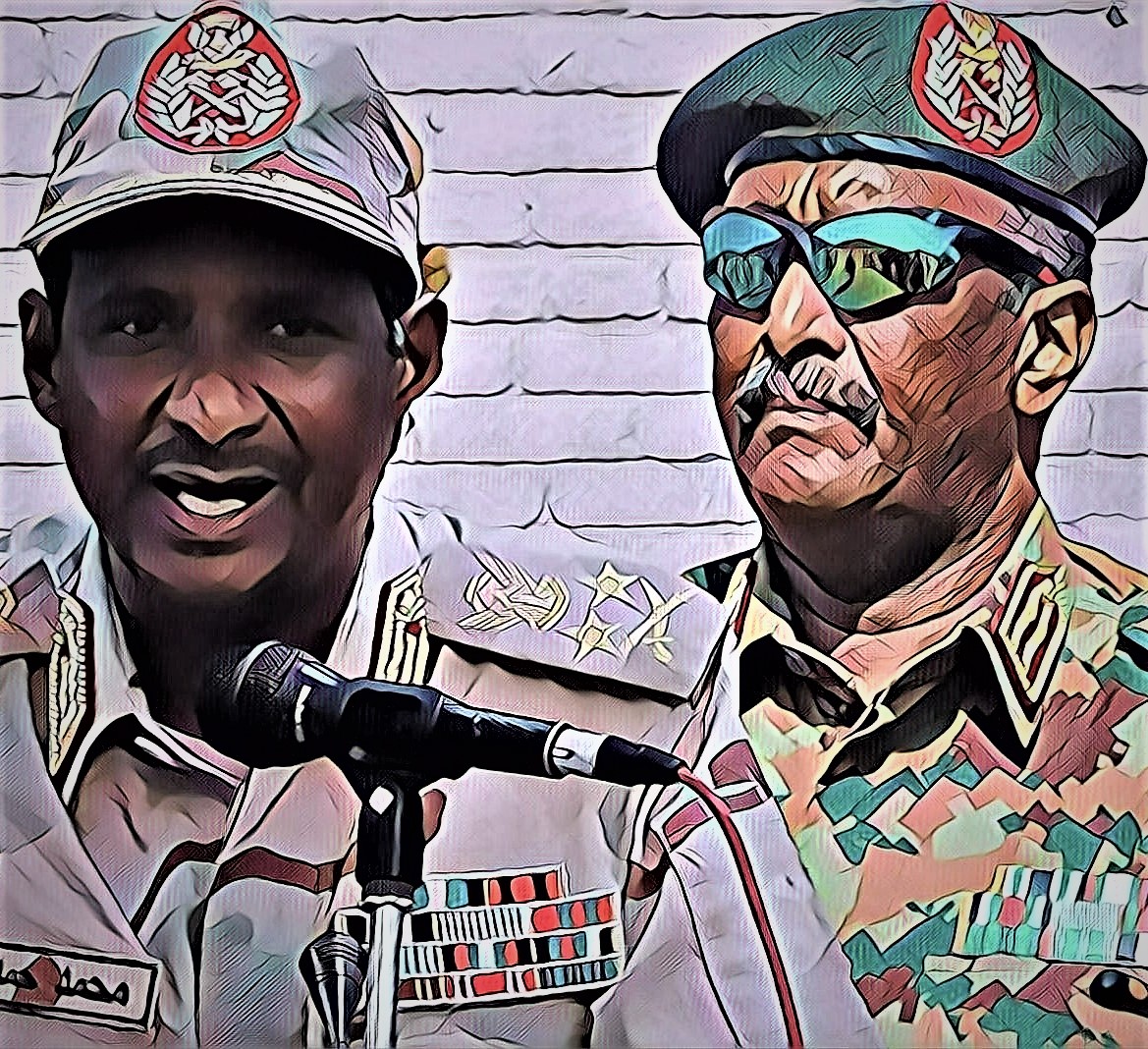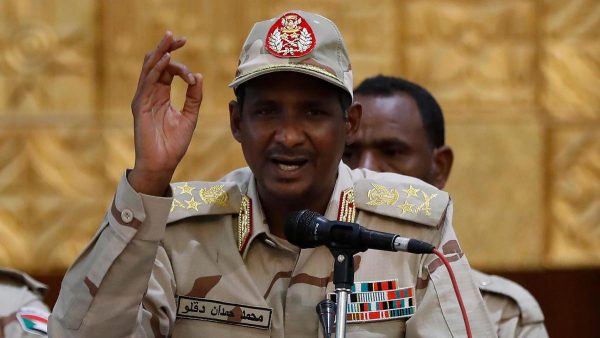
These two generals “calculated that competition for power is now a zero-sum game and so one of them throws it at the other, and unfortunately the Sudanese people have to sit on the sidelines while the two military leaders fight to the bitter end…”. That was the assessment of an analyst at the Middle East Council on Global Affairs, a think tank describing the situation in Sudan. So who are the two generals – and until recently allies – that turned the great African country upside down?
When hardline leader Omar al-Bashir was overthrown in 2019, after 30 years in power, the entire army was against him. Among the strongmen who overthrew him were the inspector general of the army, the third most powerful general in the hierarchy, Abdel Fattah al-Burhan, and his loyal team, General Mohamed Hamdan Dagalo.
It is reported that in December 2022, the army led by Al-Burhan, the Rapid Support Forces led by Daglo, and the democratic forces agreed to return to democracy, confine the army to its barracks, and include paramilitary units – that is, Daglo – in the regular army.
However, as the date for signing a follow-up agreement to start implementing those agreements approached, alliances seemed to have changed and verbal attacks intensified, leading to a wave of paramilitary attacks on the army forces.
Relations between the two men deteriorate as the pie of power seems to be getting too small for them and especially for Dagalo. So who are the two opposing Sudanese?
Al-Burhan: The actual head of state
Major General Abdel Fattah Al-Burhan has been the de facto leader of Sudan for years and the commander of the country’s army. Although relatively unknown until 2019, he had an active role in the country’s military long before Bashir’s ouster, being deployed to Darfur in the early 2000s during the conflict there, where he became a regional commander until 2008.
Omar al-Bashir and other senior Sudanese officials may have been charged with genocide and crimes against humanity by the International Criminal Court for what happened in Darfur, but the proof is as “clean” as his rival Mohamed Hamdan Dagalo.
Over the years, Burhan has distanced himself from the atrocities of the army and the paramilitary Rapid Support Forces, crushing the rebellion, killing an estimated 300,000 people and displacing another 2.7 million.
Assuming power after 2019
By 2019, Al-Burhan had gone to Jordan and Egypt for military training and by February 2018 he was the head of Sudan’s GES. When al-Bashir was overthrown in April 2019, Burhan was inspector general of the army and a third-ranking general in Sudan.
After the popular protests in 2019, Al-Burhan took over the leadership of the Transitional Military Council, which will rule the country until a democratic government is formed. However, a few months later, and under international pressure, the Sovereignty Council was formed with the cooperation of military and politicians to lead the country to elections and replace the Transitional Military Council. Therefore, Al-Burhan assumed the presidency of the Sovereignty Council, effectively assuming the duties of the head of state.
However, in 2021, Burhan and his second-in-command Dagalo lead a coup, delaying the country’s path toward democratization.
As de facto head of state, al-Burhan cultivated close ties with the United Arab Emirates, Saudi Arabia, and Egypt, which encouraged him and Dagalo to overthrow al-Bashir. That is why Sudan reinforced the Gulf states with its forces to shed the blood of the Houthi rebels in Yemen. Al-Burhan also maintained close relations with Egypt, conducting joint military exercises while he himself trained with many Egyptian generals at the Military College.
Dagalo: bloodthirsty and glamorous
Al-Burhan’s main rival is the commander of the RSF, Gen. Mohamed Hamdan Dagalo, known as “Khamiddi” or “Mohamed the Younger”.
He began his career as a militiaman in West Darfur, where rebels took up arms against Khartoum in 2003. Al-Bashir mobilized numerous militias to quell the rebellion, and in the ensuing conflict some 300,000 people were killed. Al-Bashir’s government may have disavowed “illegal” fighters who killed civilians, but the International Criminal Court has issued an arrest warrant for Al-Bashir for war crimes, while the United States has imposed other economic sanctions on his government.
Like Burgan, Dagalo burst into the international spotlight in 2019 when he assumed the position of vice president of the Transitional Military Council. However, Sudanese and Westerners knew him well because of his personality. The notorious Rapid Support Force was strengthened thanks to this military man, who created it ten years ago, in 2013. It brought together officers from the extremist Janjaweed unit and al-Bashir’s intelligence services.
All of this was done under the auspices of defendant Bashir, but Dagalo began to gain power and a significant degree of autonomy when Bashir himself, influenced by the long and imposing militia leader, began to rely on him and his fighters. To annihilate his enemies in Darfur and elsewhere in Sudan.” The truth is that Bashir did not trust the army very much, so he relied on Dagalo.
Among the richest Sudanese
Dagalo was promoted to first lieutenant and given his freedom as he seized the lucrative gold mines in Darfur of a rival chieftain, doubling his fortune. His militias took full control of the Jebel Amer mines in 2017. They faced few obstacles as they expanded their operations from Darfur to South Kordofan and other parts of the country.
“As it emerged, Hemedti’s business interests grew with Bashir’s help and his family expanded its holdings in gold mining, ranching and infrastructure,” Adel Abdel Ghaffar, director of the Security and Foreign Policy Program, told Al Jazeera. in world affairs.
Government officials and people working in the gold industry reported that in 2018, as Sudan’s economy collapsed, Bashir gave Dagalo free rein to sell gold, Sudan’s most precious natural resource, through his family business, Algunade. Al-Gunaid’s group has at times bypassed central bank controls on gold exports.
Despite Bashir’s trust in Dagalo, the latter betrayed him and participated in his overthrow. Then he became deputy chairman of the Transitional Military Council, and then a member of the Dominion Council.
The RSF killed more than 100 people in protest incidents outside the Defense Ministry in 2019. And while war crimes groups blame him for crimes committed by his forces over the past decade, Dagalo has escaped the International Criminal Court.
It is noteworthy that Daglo’s forces executed without hesitation three lions that escaped from a park last December.
Dagalo’s powerful alliances
The flamboyant Dagalo has made his own “foreign policy” of sending his troops to fight the Houthi rebels in Yemen, along with Saudi Arabia and the United Arab Emirates. In fact, this particular military man has contributed to the biggest humanitarian crisis on the planet in recent years.
He also met Western ambassadors, held talks with rebel groups, established peace between warring tribes and spoke publicly about the importance of democracy in Sudan, and he did not hide his hostility to the army.

“Hipster-friendly coffee fanatic. Subtly charming bacon advocate. Friend of animals everywhere.”







More Stories
F-16 crashes in Ukraine – pilot dies due to his own error
Namibia plans to kill more than 700 wild animals to feed starving population
Endurance test for EU-Turkey relations and Ankara with Greece and Cyprus